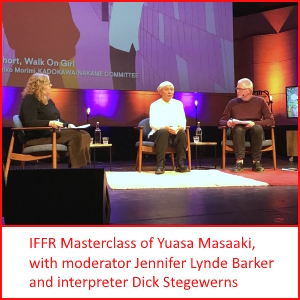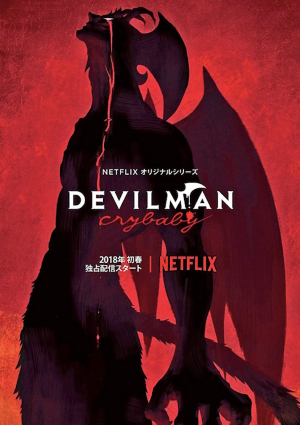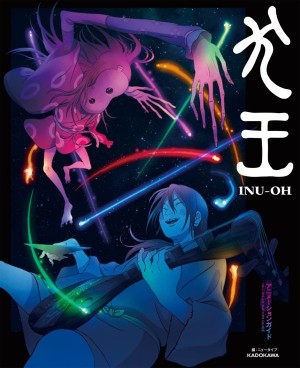Rotterdam 2023 Interview: Yuasa Masaaki Talks About The Last Nine Years

 And why not? The man is one of the greatest animation directors and artists in the world! Anime expert Peter van der Lugt and I had interviewed Yuasa Masaaki almost a decade ago, at length (long enough that we had to split that interview into part 1 and part 2). But that interview had been done through Skype, so the both of us were not going to pass up on this chance to meet the man himself for real. We were granted thirty minutes and we started right where we left the previous conversation.
And why not? The man is one of the greatest animation directors and artists in the world! Anime expert Peter van der Lugt and I had interviewed Yuasa Masaaki almost a decade ago, at length (long enough that we had to split that interview into part 1 and part 2). But that interview had been done through Skype, so the both of us were not going to pass up on this chance to meet the man himself for real. We were granted thirty minutes and we started right where we left the previous conversation.
ScreenAnarchy: We interviewed you nine years ago, when you had just released Kick-Heart, so we'd like to focus now on the last nine years. Back in October 2013 you and Eunyoung Choi had just started your own animation studio, Science Saru. Why did you start your own studio?
Masaaki Yuasa: Well, as our experiment for using crowdfunding to finance Kick-Heart would tell you, the environment was not so easy to make my productions. We came to the conclusion that it was relatively difficult to make the productions we wanted to do with major producers. So we thought it might be an option to start our own small studio and so try to make our own productions by ourselves.
Looking at the time before you had your own studio and after it, what was the biggest difference for you?
It gave us more freedom, the right to decide things by ourselves. And we could implement any decisions we made a lot faster. Also, apart from that, doing everything by ourselves gave us a lot of experience about the producing part of the whole process, which was something we didn't have before.
One of the things we heard was that within Science Saru Studio there is a different culture when compared to other animation studios. More emphasis is placed on the well-being of its animators, giving them more time to rest, to develop, and not work themselves to death. Did you succeed in achieving that?
 We have indeed endeavoured to bring this about and I think to a large extent we've been able to implement this. But you should also understand that there exists some kind of hierarchy within studios. For veteran animators, the actual workload may be relatively easy. By now of course, nearly all of them are veterans. We found out that good communication is really important, really necessary. When the communication between the production side and the animation side is good, then you can avoid people having to work way too hard. For those animators who aren't veterans yet, we try to follow them on a case-by-case basis so they don't go wrong. But judging from my own experiences, working conditions are now better than they used to be.
We have indeed endeavoured to bring this about and I think to a large extent we've been able to implement this. But you should also understand that there exists some kind of hierarchy within studios. For veteran animators, the actual workload may be relatively easy. By now of course, nearly all of them are veterans. We found out that good communication is really important, really necessary. When the communication between the production side and the animation side is good, then you can avoid people having to work way too hard. For those animators who aren't veterans yet, we try to follow them on a case-by-case basis so they don't go wrong. But judging from my own experiences, working conditions are now better than they used to be.
The team at Science Saru is also quite diverse, and diversity is something we can also see in its productions like In Japan Sinks: 2020. How important is diversity to you?
(laughs) I don't think there is a very direct relation between our diversity and the content we create. We choose what we make and we do so freely. As for the diversity in our team: as a studio you want to mobilize the proficiencies and skills in your team as much as possible, and you will get more out of a varied team.
You were the CEO of Science Saru, but recently you stepped down and that position was taken over by Eunyoung Choi. Why did you decide to stop as CEO and what is currently your connection with the studio? Are you still attached or are you more like a freelancer?
 I'm a freelancer these days. As for stepping down, from the very start it was never the intention to have me stay on as CEO continuously.
I'm a freelancer these days. As for stepping down, from the very start it was never the intention to have me stay on as CEO continuously.
When we think about the work you create as a director, you have a very distinct and bold visual style. This is very apparent in works like Kemenozume. In a film like Ride Your Wave you use a far more conventional style. How do you decide on the overall look of a project?
In the case of Ride Your Wave, we had a very clear aim to reach a wider audience. Moreover, the team on that film was relatively young, so we decided to use a better known, easier, style.
You recently adapted Devilman: Crybaby. That must be very hard because you then have to work based on art from the manga and the existing anime of the seventies. How do you adapt your distinct style to that?
We saw that the original anime indeed has a very characteristic style and I think it also really represents that time. I had no difficulties with the style as I had read the manga like that, at a young age, and saw those anime. I tried to translate my experiences of reading these manga as a boy, seeing the anime back then, to a present-day audience. So people can relate to it the same way I did at the time.
 As for keeping rigidly to the style which was used: its creator Go Nagai started out at Shonen Manga magazine, and you could see him evolve over time, he changed his own style as well. So you have some leeway. And you also need to keep in mind the team with which you are working. I can tell them what my intended image looks like, but they all have their own styles too, they have their own ideas, and this will also reflect into the final product.
As for keeping rigidly to the style which was used: its creator Go Nagai started out at Shonen Manga magazine, and you could see him evolve over time, he changed his own style as well. So you have some leeway. And you also need to keep in mind the team with which you are working. I can tell them what my intended image looks like, but they all have their own styles too, they have their own ideas, and this will also reflect into the final product.
How much freedom do you allow your team? Or how much of your own vision do they need to adhere to?
I try to give them as much freedom as I can so sometimes there may be some need for me to adjust things in the end. As far as Devilman: Crybaby is concerned, it became slightly different from how I had imagined it myself, but I was satisfied with how it turned out. Some aspects were quite extreme and I really wondered if we should keep that all in, because even a slight extreme element can already have quite a big influence on the end product. We kept a lot because the final overriding criterion of course is the quality of the finished version. THAT determines whether I have to interfere or not.
The story told in it is very sad, almost punishingly so for the audience. Why did you decide to adapt the original that way?
 The same can be said about Inu-Oh, which is also not a very happy story in the end. In both of these cases I needed to be sure to keep some kind of hope in there as well, to balance the sadness in the story. In Devilman: Crybaby, I think there is some small rescue in there as well as in the end both main characters move towards a common goal.
The same can be said about Inu-Oh, which is also not a very happy story in the end. In both of these cases I needed to be sure to keep some kind of hope in there as well, to balance the sadness in the story. In Devilman: Crybaby, I think there is some small rescue in there as well as in the end both main characters move towards a common goal.
In previous interviews after the release of Inu-Oh you were asked if you were going to retire and you replied that you were just taking a sort of a break right now. Do you aim to recharge and make something new in the future?
That indeed is true. After Inu-Oh I took some sort of a break to take it easy. Going forward, I also intend to take it relatively easy for the time being. At the same time I'm working on the next project. I'm preparing things.
Thank you very much for your time and we look forward to your next project.
And that, unfortunately, was all we had time for. Many thanks go to the IFFR press desk for helping to arrange this interview, and many thanks go to interpreter Dick Stegewerns, without whom it would have been a very short interview indeed. Inu-Oh is playing at festivals and is being released on Blu-ray in several editions across the globe, and do check that film out, it's awesome.
Peter van der Lugt
contributed to this story.

Do you feel this content is inappropriate or infringes upon your rights? Click here to report it, or see our DMCA policy.






